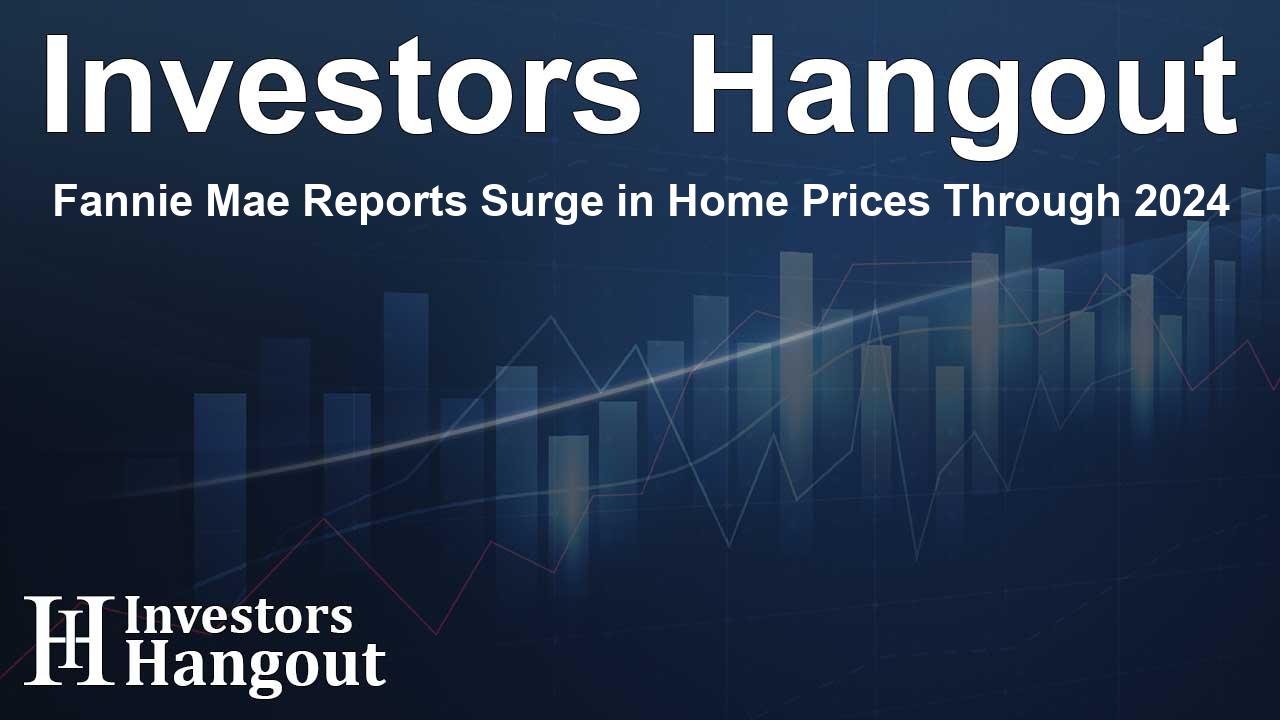Fannie Mae Reports Surge in Home Prices Through 2024

Growth in Home Prices Indicated by Fannie Mae
Latest FNM-HPI Reading Shows Year-over-Year Increase of 5.8 Percent
According to recent data from Fannie Mae (OTCQB: FNMA), single-family home prices experienced a notable increase of 5.8 percent from the same quarter last year. This figure represents a recovery from a previously revised annual growth of 5.4 percent in Q3. The Fannie Mae Home Price Index (FNM-HPI) serves as a crucial metric, helping analyze nationwide price changes for homes, excluding condominiums.
On a quarterly scale, home values surged by a seasonally adjusted 1.7 percent in Q4 2024, showing an improvement from the downward revision of a 1.2 percent growth rate recorded in the previous quarter. However, when looking at non-seasonally adjusted data, home prices increased only 0.3 percent.
Mark Palim, Fannie Mae's Senior Vice President and Chief Economist, stated, "The acceleration in year-over-year home price growth in the fourth quarter follows two consecutive quarters of decline. Although inventory levels for existing homes have improved when compared to last year, they still remain low historically due to the 'lock-in effect' on mortgage rates. Since early October, we've seen a rise in mortgage rates, which affects affordability and diminishes homeowners' willingness to sell their properties. The emergence of a new 7 percent interest rate psychologically impacts potential sellers, thereby stalling the housing market further."
Palim further elaborated that the housing market heading into 2025 must navigate complex challenges. A significant drop in mortgage rates may be essential to relieve the current inventory constraints, allowing more homes to become available for sale. Yet, lower rates could also ignite strong demand from first-time buyers who have been holding back. This imbalance could intensify existing issues with home prices and affordability.
The FNM-HPI is compiled using detailed, county-level data, producing both seasonally adjusted and adjusted national indices that reflect general trends in single-family home prices across the country. This index has valuable historical data, starting from Q1 1975 and continuing through the most recent quarter.
Presently, Fannie Mae makes the FNM-HPI publicly accessible quarterly. This includes a comprehensive summary that outlines methodology and raw data related to home price trends. The index serves as a pivotal resource for investors, policymakers, and those involved in real estate.
For an in-depth look at the FNM-HPI, visit Fannie Mae's Research & Insights page. It's an excellent resource for understanding data and analytics relevant to the housing market.
About the Economic and Strategic Research Group
Fannie Mae's ESR group, led by Mark Palim, examines data trends and conducts surveys to produce key forecasts and analyses concerning the economy, mortgage markets, and housing overall.
About Fannie Mae
Fannie Mae plays a crucial role in promoting equitable and sustainable access to homeownership, providing millions of Americans with tools for homebuying and affordable rental housing. Their robust frameworks enable the utilization of fixed-rate mortgages and foster innovations aimed at simplifying the housing experience.
Frequently Asked Questions
What is the Fannie Mae Home Price Index (FNM-HPI)?
The FNM-HPI is a national index that tracks average price changes for single-family homes, excluding condos.
How much did home prices increase in 2024?
Home prices increased by 5.8 percent year-over-year from Q4 2023 to Q4 2024, according to Fannie Mae.
What factors are affecting the housing market heading into 2025?
The housing market faces challenges including low inventory, high mortgage rates, and the 'lock-in effect' that discourages current homeowners from selling.
Who leads the Economic and Strategic Research Group at Fannie Mae?
The ESR group is led by Mark Palim, who is the Senior Vice President and Chief Economist at Fannie Mae.
What is the significance of the 'lock-in effect'?
The 'lock-in effect' refers to homeowners being less willing to sell due to the low mortgage rates they currently hold, which makes them reluctant to enter into a new mortgage at higher rates.
About Investors Hangout
Investors Hangout is a leading online stock forum for financial discussion and learning, offering a wide range of free tools and resources. It draws in traders of all levels, who exchange market knowledge, investigate trading tactics, and keep an eye on industry developments in real time. Featuring financial articles, stock message boards, quotes, charts, company profiles, and live news updates. Through cooperative learning and a wealth of informational resources, it helps users from novices creating their first portfolios to experts honing their techniques. Join Investors Hangout today: https://investorshangout.com/
Disclaimer: The content of this article is solely for general informational purposes only; it does not represent legal, financial, or investment advice. Investors Hangout does not offer financial advice; the author is not a licensed financial advisor. Consult a qualified advisor before making any financial or investment decisions based on this article. The author's interpretation of publicly available data shapes the opinions presented here; as a result, they should not be taken as advice to purchase, sell, or hold any securities mentioned or any other investments. The author does not guarantee the accuracy, completeness, or timeliness of any material, providing it "as is." Information and market conditions may change; past performance is not indicative of future outcomes. If any of the material offered here is inaccurate, please contact us for corrections.